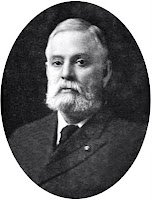 |
| John Reynolds |
-----------------------------------------------------------------------
WASHINGTON D.C., September 11, 1862 (Sent 10.20)
Major-General McClellan
The Governor of Pennsylvania wishes the services of General Reynolds. Can you order him here for that purpose? H.W. Halleck, General-in-Chief
-----------------------------------------------------------------------
Headquarters, Army of the Potomac
ROCKVILLE, MD., September 11, 1862 (10.45 a.m.)
Maj. Gen. H.W. Halleck, General in Chief:
General Reynolds is now engaged in important service, supporting with his division an attack on New Market. He has one of he best divisions, and is well acquainted with it. I cannot see how his services can be spared at the present time.
GEO. B. McCLELLAN, Major-General
----------------------------------------------------------------------
WASHINGTON D.C., September 11, 1862 (Sent 1.55 p.m.)
Major-General McClellan, Rockville, Md.:
General Reynold's division can be commanded by some one else. He has been designated for other duty, and must report here immediately.
H.W. Halleck, General-in-Chief
----------------------------------------------------------------------
Headquarters, Army of the Potomac
MIDDLEBROOK, MD., September 11, 1862
Maj. Gen. H.W. Halleck, General in Chief:
I have ordered General Reynolds to report to Governor Curtin at the earliest practicable moment. He is now about 25 miles from here. He will probably not be able to start before morning.
GEO. B. McCLELLAN, Major-General
----------------------------------------------------------------------
Hdqrs, Third Corps, Army of Virginia
Ridgeville, Md., September 12, 1862
Brig. Gen. S. Williams, Assistant Adjutant General:
I have just been shown an order relieving Brigadier-General Reynolds from command of a division in my corps. I request that the major-general commding will not heed this order; a scared Governor ought not to be permitted to destroy the usefulness of an entire division of the army, on the eve of important operations.
General Reynolds commands a division of Pennsylvania troops of not the best character; is well known to them, and I have no officer to fill his place.
It is satisfactory in my mind that the rebels have no more intention of going to Harrisburg than they have of going to heaven.
It is only in the United States that atrocities like this are entertained.
JOSEPH HOOKER,
Major-General, Commanding Corps.































